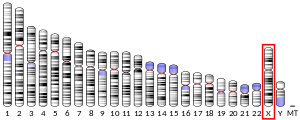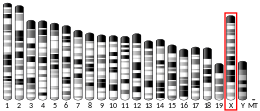^ a b c GRCh38: Ensembl release 89: ENSG00000147138 – Ensembl , May 2017^ a b c GRCm38: Ensembl release 89: ENSMUSG00000073008 – Ensembl , May 2017^ "Human PubMed Reference:" . National Center for Biotechnology Information, U.S. National Library of Medicine .^ "Mouse PubMed Reference:" . National Center for Biotechnology Information, U.S. National Library of Medicine .^ "Entrez Gene: GPR174 G protein-coupled receptor 174" .^ Liu G, Li X, Wang Y, Zhang X, Gong W (2023). "Structural basis for ligand recognition and signaling of the lysophosphatidylserine receptors GPR34 and GPR174" . PLOS Biol . 21 (12): e3002387. doi :10.1371/journal.pbio.3002387 PMC 10721165 PMID 38048360 . {{cite journal }}: CS1 maint: multiple names: authors list (link )^ Nie Y, Qiu Z, Chen S, Chen Z, Song X, Ma Y; et al. (2023). "Specific binding of GPR174 by endogenous lysophosphatidylserine leads to high constitutive Gs signaling" . Nat Commun . 14 (1): 5901. doi :10.1038/s41467-023-41654-3 . PMC 10516915 PMID 37737235 . {{cite journal }}: CS1 maint: multiple names: authors list (link )
Takeda S, Kadowaki S, Haga T, et al. (2002). "Identification of G protein-coupled receptor genes from the human genome sequence". FEBS Lett . 520 (1– 3): 97– 101. Bibcode :2002FEBSL.520...97T . doi :10.1016/S0014-5793(02)02775-8 . PMID 12044878 . S2CID 7116392 . Strausberg RL, Feingold EA, Grouse LH, et al. (2003). "Generation and initial analysis of more than 15,000 full-length human and mouse cDNA sequences" . Proc. Natl. Acad. Sci. U.S.A . 99 (26): 16899– 903. Bibcode :2002PNAS...9916899M . doi :10.1073/pnas.242603899 PMC 139241 PMID 12477932 . Gerhard DS, Wagner L, Feingold EA, et al. (2004). "The status, quality, and expansion of the NIH full-length cDNA project: the Mammalian Gene Collection (MGC)" . Genome Res . 14 (10B): 2121– 7. doi :10.1101/gr.2596504 . PMC 528928 PMID 15489334 . Ross MT, Grafham DV, Coffey AJ, et al. (2005). "The DNA sequence of the human X chromosome" . Nature . 434 (7031): 325– 37. Bibcode :2005Natur.434..325R . doi :10.1038/nature03440 . PMC 2665286 PMID 15772651 .




